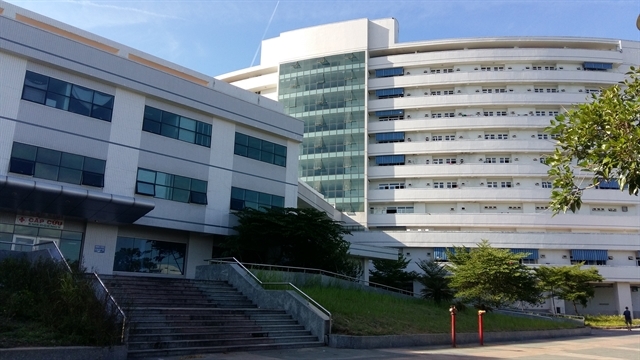 |
| A hospital in Đà Nẵng. A total of 274 Vietnamese citizens returning from Malaysia have tested negative for SARS-CoV-2 according to the city’s Centre for Disease Control (CDC). |
A total of 274 Vietnamese citizens returning from Malaysia have tested negative for SARS-CoV-2 for the first time as test results were released by the city’s Centre for Disease Control (CDC) on Monday.
Director of the Đà Nẵng CDC Dr Tôn Thất Thạnh said samples of the 274 people were taken one day after they were quarantined at the city’s Military Training School from Sunday (May 10).
They will be receiving daily medical checks and monitoring during the 14-day isolation period before getting health certificates for going home, he said.
A 17-month-old baby, who returned to Việt Nam during treatment for hydrocephalus in Malaysia, has been isolated and is undergoing special treatment at the Obstetrics and Paediatrics hospital.
These Vietnamese citizens were taken on a Vietnam Airlines flight from Kuala Lumpur to Đà Nẵng on Sunday.
Earlier, the city isolated Vietnamese citizens returning from Korea, Italy and the UK.
Only six COVID-19 patients including two from the UK and one American have been treated at the city’s hospitals between March 7 and April 10. All six patients have returned home after successful treatment for COVID-19.
Vietnam to bring 300 citizens home from Australia in early June
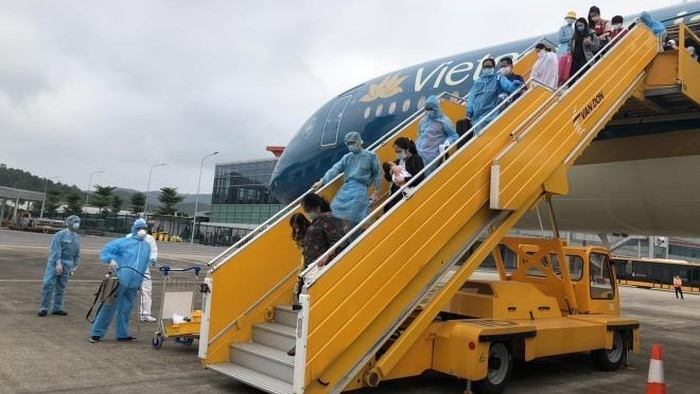 |
The Vietnamese Embassy in Australia has worked with relevant agencies to organise the return of approximately 300 Vietnamese citizens from Australia in early June.
The flight to carry the citizens is scheduled to depart from Sydney. It is a priority flight conducted under the Government’s direction to bring home people under 18 years old, elderly and sick people, students who did not have accommodations due to dormitory closures, guest workers with expired visa and work permit, and stranded tourists.
The citizens will pay for the air tickets and will be placed in concentrated quarantine facilities for 14 days.
The Vietnamese Embassy in Australia recommended that citizens who wish to return Vietnam should urgently use their Gmail accounts to register and fill in an online form before 17:00 on May 18.
The diplomatic agency noted that when completing the registration form, citizens need to present their situation and their need for returning home. Vietnamese people who have permanent residency or Australian citizenship are not considered priority people to return to Vietnam at this time.
‘Rice ATMs’ provide staple for struggling Indonesians amid COVID-19
The COVID-19 pandemic has left millions of Indonesians struggling to make ends meet. Now the local authorities are rolling out “rice ATMs” in a bid to ensure greater access for those in need to the essential staple.
There are ten “rice ATMs” in and around Jakarta. This is part of a government initiative to assist the people worst affected by the outbreak, which has caused millions to lose their jobs in Southeast Asia’s largest economy.
Stacked with good-quality rice and operated by magnetic cards, the tall automated machines look much like a typical ATM, only that they pump out grain instead of cash.
Ibrahim, an army official supervising distribution, said a total of 1.5 tonnes of rice are prepared for around 1,000 residents everyday. The distribution is carried out every day, even on weekends.
More than 14,000 Indonesians have been infected with the coronavirus since early March, with 991 killed by the disease, the highest death toll in East Asia outside China.
Indonesian Finance Minister Sri Mulyani Indrawati told the parliament last week the pandemic has set efforts to eradicate poverty back a decade.
In March, Indonesia announced a 25-billion-USD stimulus package in response to the COVID-19, pledging to provide social welfare for up to 10 million households, including food assistance and electricity tariff discounts.
Residents eligible for the rice ration include daily wage earners, the unemployed, those who do not own a house and people who live below the poverty line.
The “rice ATM” was first introduced by a Vietnamese entrepreneur in Ho Chi Minh City early last month to provide free rice for people out of work because of the COVID-19./.
Indonesia evaluates large-scale social restrictions
Indonesian President Joko Widodo assessed the implementation of the large-scale social restrictions (PSBB) policy to curb the spread of the COVID-19 during a meeting held via teleconference on May 12.
He noted that the results before and after the implementation of the PSBB were varied and differed across four provinces and 72 districts and cities.
Consequently, the number of new cases in regions had decreased gradually and consistently but not drastically, though there were areas where the number of cases had declined but had also not been consistent and still volatile.
Of the 10 provinces with the most positive cases, only three, namely Jakarta, West Java, and West Sumatra, had the PSBB status, while seven others were still non-PSBB. However, those provinces implemented a physical distancing policy and strict health protocols in the people's daily lives.
Data of the Task Force on COVID-19 prevention showed that Java records 70 percent of the positive cases, and 82 percent of mortality.
The president urged the force to ensure that the COVID-19 pandemic is effectively brought under control in five provinces in Java, especially in the subsequent two weeks.
During the meeting, he also sought to ease the PSBB in a careful manner and not hurriedly.
Most businesses in Indonesia only have enough cash to continue operating until the end of June, said Sutrisno Iwantono, deputy chairman of public policy at the Indonesian Employers' Association.
Indonesia’s economy expanded only 2.97 percent in the first quarter, its lowest in almost two decades./.
Vietnam records no new COVID-19 infections in community for 26 days
|
|
|
A teacher guides a student how to wash hands correctly
|
Vietnam reported no new COVID-19 cases on May 12 morning, marking the 26th day in a row without infections in the community, according to the National Steering Committee for COVID-19 Prevention and Control.
Among the 288 confirmed cases so far, 148 are imported ones and were quarantined upon their arrival in the country, and the remaining 140 contracted the novel coronavirus SARS-CoV-2 in the community.
As many as 249 patients, or 86 percent of the total, have recovered from the disease.
On May 11, eight patients treated at the Hanoi-based National Hospital for Tropical Disease No. 2 were given the all-clear. They will continue undergo quarantine and health monitoring for the next 14 days.
Of the 39 remainders still under treatment, eight have tested negative for SARS-CoV-2 once while 11 others negative at least twice.
A total of 11,929 people are kept in quarantine at present, including 329 at hospitals, 6,432 at other quarantine facilities, and the rest at home./.
Vietnamese in Japan staying calm, supporting one another during pandemic: Ambassador
 |
| Vietnamese in Japan staying calm, supporting one another during pandemic: Ambassador hinh anh 1 Vietnamese Ambassador to Japan Vu Hong Nam gives an interview to the Vietnam News Agency |
Despite the rapid spread of the COVID-19 in Japan, the Vietnamese community remains calm and supports each other in coping with the pandemic, according to Ambassador Vu Hong Nam.
He told the Vietnam News Agency that although the lives and livelihoods of Vietnamese people in Japan have been disrupted by the pandemic, the community is calm and patient and complying with guidelines from both the Japanese and Vietnamese Governments.
As a result, the number of Vietnamese infected with SARS-CoV-2, the coronavirus that causes COVID-19, is quite small, the diplomat noted, adding that thanks to the assistance given by the Japanese health system and Government, some Vietnamese patients have recovered and returned to normality.
Talking about the difficulties facing Vietnamese in Japan, he said most went to work or study in the country but the pandemic has halted such endeavours. Expatriates working in Japan, especially those at small- and medium-sized enterprises, have encountered numerous problems after many businesses were shut down.
However, the ambassador said, during these trying times, the community has upheld the tradition of mutual support. Benefactors have offered free accommodation and raised money to help students who lost their part-time jobs and thus are unable to cover their daily needs.
The embassy has also called on associations and benefactors to make donations to assist needy people and encouraged all staff at Vietnam’s representative agencies in Japan to contribute one day’s salary each to the common effort, the ambassador said.
He expressed his belief that with the community’s joint efforts, all Vietnamese in Japan will overcome the hardships./.
‘Zero dong’ supermarket bringing smiles to those in need
The ongoing COVID-19 pandemic has caused heavy losses in both the economy and society, but amid the hardship there are still stories about efforts to join hands and overcome the situation.
In normal times, Nguyen Van Mai’s welding job earns him enough money to raise his two children. The sudden outbreak of COVID-19, however, saw him lose his job, so the free rice dispenser and “0 VND” supermarket that opened recently in Da Nang have provided much-needed relief.
Since late April, the rice dispenser at the cultural house of Binh Thuan ward has become a destination for benefactors, mostly businesses in the city, to offer help. It operates all day every day, while the “0 VND” supermarket is open every Tuesday and Saturday.
Photo exhibition to honour efforts against pandemic
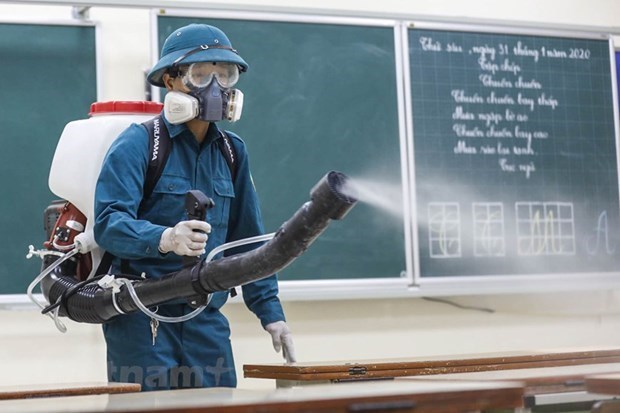 |
| A worker fumigates a classroom of a Hanoi school to prevent COVID-19 transmission |
The Vietnam Association of Photographic Artists (VAPA) is inviting photos of Vietnam in the combat against COVID-19 to an exhibition slated for June 1.
VAPA Chairman Vu Quoc Khanh said on May 11 that the event aims to push ahead with communications to raise public awareness of the pandemic, highlight Vietnam’s enormous achievements in the COVID-19 fight, and honour the photo takers.
The organising board said photos sent to the exhibition should depict the country and people in the disease prevention and control efforts, their daily lives in the pandemic, along with the exemplars and those working in the frontline.
Senders can be professional photographers, photo journalists or those able to take COVID-19-themed photos in Vietnam, and each can submit up to 20 works that are separate photos or groups of photos.
The exhibition is open for entries via website www.trienlamanhCovid-19.com from now through May 20. The best 150-200 items will be selected for the display.
The event will be held at the VAPA’s centre for artistic photo archives and exhibition in Hanoi./.
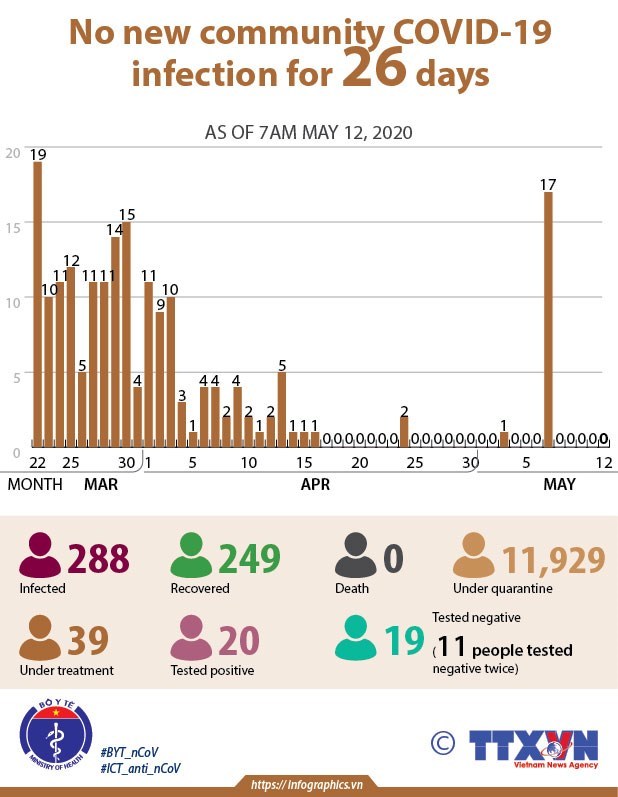 |
Eight more COVID-19 patients given all-clear, total recoveries at 249
Eight COVID-19 patients, all Vietnamese, have recovered and were discharged from the National Hospital of Tropical Diseases in Hanoi on May 11, putting the total recoveries at 249.
They include four patients from the pandemic hotspot in Ha Loi commune, Me Linh district on the outskirts of Hanoi, two from Thai Nguyen province, one from Hung Yen province and the last from Bac Giang province.
They all had two tests last week and both came back negative for SARS-CoV-2 that causes COVID-19. The patients are in stable condition with no fever, no cough and no shortness of breath.
All of them will continue to be quarantined and monitored for the next 14 days.
No new COVID-19 case was reported in Vietnam as of May 11 morning, marking 25 straight days without community transmission in the country, according to the National Steering Committee for COVID-19 Prevention and Control.
The country’s tally remains at 288, including 148 imported cases who had been quarantined upon arrival, and 140 infected within the community.
The British pilot, known as Patient No. 91 who is being treated at the Hospital for Tropical Diseases in Ho Chi Minh City, is still in critical condition.
Doctors from top hospitals in Vietnam held a telemedicine conference on May 10 to discuss a lung transplant for the patient. They proposed moving him to Cho Ray Hospital for intensive care and lung transplant consideration.
As many as 25,361 people are under health monitoring or quarantine, of whom 373 stay at hospitals, 11,181 at other quarantine establishments and 13,807 at home and accommodations./.
 |
Indonesia to allow citizens under 45 to resume working amid pandemic
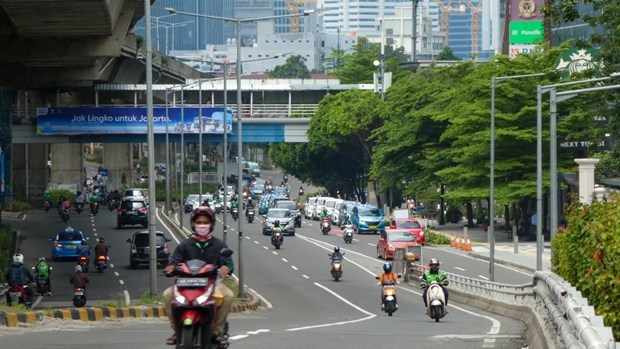 |
|
A street in Indonesia amid COVID-19 (Photo: https://wam.ae/) |
Indonesian citizens aged 45 and under may be allowed to resume working because they are not prone to the COVID-19, according to head of the country's COVID-19 task force Doni Monardo.
Speaking at an online press conference on May 11, Doni stressed that this move aims to minimise layoffs in the Southeast Asian country amid the effect of the pandemic.
People under 45 are physically healthy and have high mobility, he noted, adding that the mortality rate in this group is only 15 percent, while that of the group of people over 60 is 45 percent.
According to Coordinating Minister for Economic Affairs Airlangga Hartarto, the Indonesian government planned to ease social restrictions from June.
The imposition of restrictions since late March has forced many businesses, especially those in non-essential sectors, to suspend operations and lay their employees off to cut costs.
According to statistics by the Indonesian Ministry of Manpower, as of May 1, more than 1.7 million local workers lost their jobs.
The number of confirmed COVID-19 cases in Indonesia rose to 14,265, after the country reported 233 new infections on May 11./.
COVID-19 threatens stability of Indonesia’s financial system
 |
|
A officer wearing protective gear checks rupiah banknotes at the Bank Mandiri cash center in Jakarta on March 20 - Illustrative image (Source: jakartapost)
|
The Financial System Stability Committee (KSSK) of Indonesia has warned that the COVID-19 pandemic is threatening the stability of the country’s financial system as it causes a supply-demand shock and weakens financial industry and macro-economy.
Finance Minister Sri Mulyani Indrawati, who serves as the committee’s chair, said on May 11 that the supply-demand shock and lower GDP outlook posed a serious threat to financial system stability.
The nation’s GDP grew by 2.97 percent year-on-year in the first quarter of 2020, the lowest level seen since 2001.
The economy has almost come to a halt following physical distancing measures implemented by businesses and consumers to contain the coronavirus spread. The KSSK expects the economy to grow at 2.3 percent this year, a marked slowdown from 5.02 percent in 2019.
During the first quarter, the country’s financial markets were badly hit as foreign investors sold a net of around 145 trillion Rp (9.72 billion USD) worth of Indonesian assets as they flocked into safe havens. The capital outflow was towering compared to 69.9 trillion Rp recorded during the 2008 global financial crisis and 36 trillion Rp during the taper tantrum period in 2013, the KSSK revealed.
The situation saw the rupiah fall to its lowest level in history at 16,575 Rp per US dollar on March 23, down 15.8 percent from February, according to the committee data. The currency has since recovered a bit, gaining 10.21 percent as of April 30 compared to late March, as the government issued 4.3 billion USD worth of global bonds in early April.
The Financial Services Authority of Indonesia (OJK) revealed on May 11 that loan growth in the banking industry amounted to 7.95 percent year on year in the first quarter, higher than the 6.08 percent recorded at the end of last year. However, no new loan demand was recorded in the period, as the growth came from the disbursement of existing credit facilities, OJK chairman Wimboh Santoso said./.
Indonesia specifies focuses in coping with COVID-19 pandemic
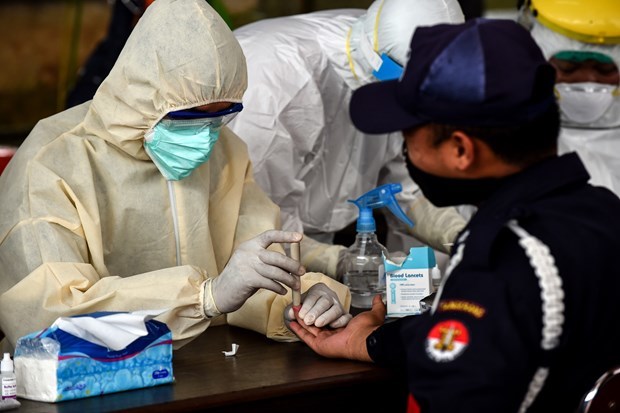 |
|
A man has his blood sample taken for rapid COVID-19 testing in South Tangerang, Indonesia's Banten province, on April 21 (Photo: Xinhua/VNA)
|
Indonesian President Joko Widodo on May 11 stressed three focuses to deal with the COVID-19 pandemic, namely scaling up tests, boosting surveillance on migrant workers who will come back home, and accelerating the production of medical equipment and COVID-19 medicine.
Addressing a Cabinet meeting, he requested PCR tests be sped up as laboratories across the country are currently able to handle just 4,000-5,000 samples each day, much lower than the target of 10,000.
The president ordered the COVID-19 task force to maximise the function of test facilities as only 53 have been licensed to conduct PCR tests, quicken manpower training, and deal with the scarcity of testing equipment and materials right this week.
He also told ministries, sectors and localities to make thorough preparations to receive 34,000 migrant workers who will return to the country in May and June, with tight health protocols to be imposed.
Meanwhile, units of the Ministry of Research and Technology and the Ministry of Education and Culture have successfully developed rapid and PCR test kits, ventilators and BSL-2 labs which can be produced on a large scale now, he said, expressing his hope that this will help the country reduce its dependence on imports./.
Thailand prepares online teaching for new school year
Thailand’s Ministry of Education is going to test an on-air and online learning system, in case at-school teaching is not safe enough for the start of the new semester on July 1.
The ministry’s deputy spokesperson Rakana Tantawutho revealed that schools and education institutes under the ministry’s supervision will start the first semester from July 1 to November 13, and the second one from December 1 to April 10.
The ministry is preparing an appropriate method for the learning system during the COVID-19 outbreak, as well as adding more skill classes during the school breaks.
The new curriculum will allow students to access education and stay safe at the same time.
It will also reduce assessments and cut unnecessary activities.
In addition, the ministry will conduct a survey of students, parents and teachers, in order to develop the right tools and a suitable schedule.
On May 11, Thailand recorded six more COVID-19 cases, raising its total infections to 3,015, including 56 deaths./.
Thailand prepares online teaching for new school year
 |
|
Students at a Thai school (Source: Bangkok Post) |
Thailand’s Ministry of Education is going to test an on-air and online learning system, in case at-school teaching is not safe enough for the start of the new semester on July 1.
The ministry’s deputy spokesperson Rakana Tantawutho revealed that schools and education institutes under the ministry’s supervision will start the first semester from July 1 to November 13, and the second one from December 1 to April 10.
The ministry is preparing an appropriate method for the learning system during the COVID-19 outbreak, as well as adding more skill classes during the school breaks.
The new curriculum will allow students to access education and stay safe at the same time.
It will also reduce assessments and cut unnecessary activities.
In addition, the ministry will conduct a survey of students, parents and teachers, in order to develop the right tools and a suitable schedule.
On May 11, Thailand recorded six more COVID-19 cases, raising its total infections to 3,015, including 56 deaths./.
Cambodians advised to postpone large gatherings
 |
|
The Cambodian Ministry of Health's spokeswoman Or Vandine advises citizens to wait two or three months to assess the global situation. (Source: phnompenhpost.com)
|
The Cambodian Ministry of Health on May 11 continued warning people to postpones large gathering events, including weddings, to contain the spread of the novel coronavirus, although the country has reported no new cases for days.
Speaking at a press conference, Or Vandine, spokesperson for the ministry, said that Cambodia is getting back to normal, but citizens must take daily prevention measures, including washing hands, wearing masks and avoiding gatherings.
She said citizens must remain vigilant and suggested suspending wedding parties, religious gatherings, and night outings because it is easy for the virus to spread in these settings.
Vandine also advised citizens to wait two to three more months to assess the global situation.
In its May 12 announcement, the ministry said that the country has recorded no new infections, and 120 out of 122 infections have given the all-clear./.
